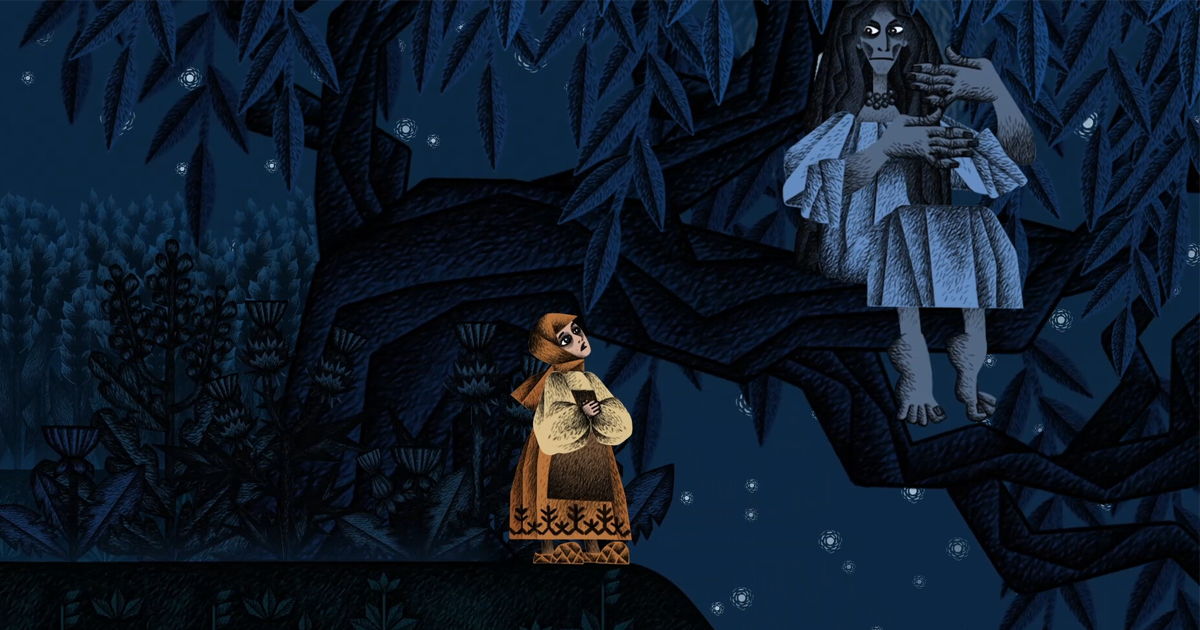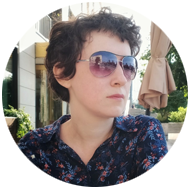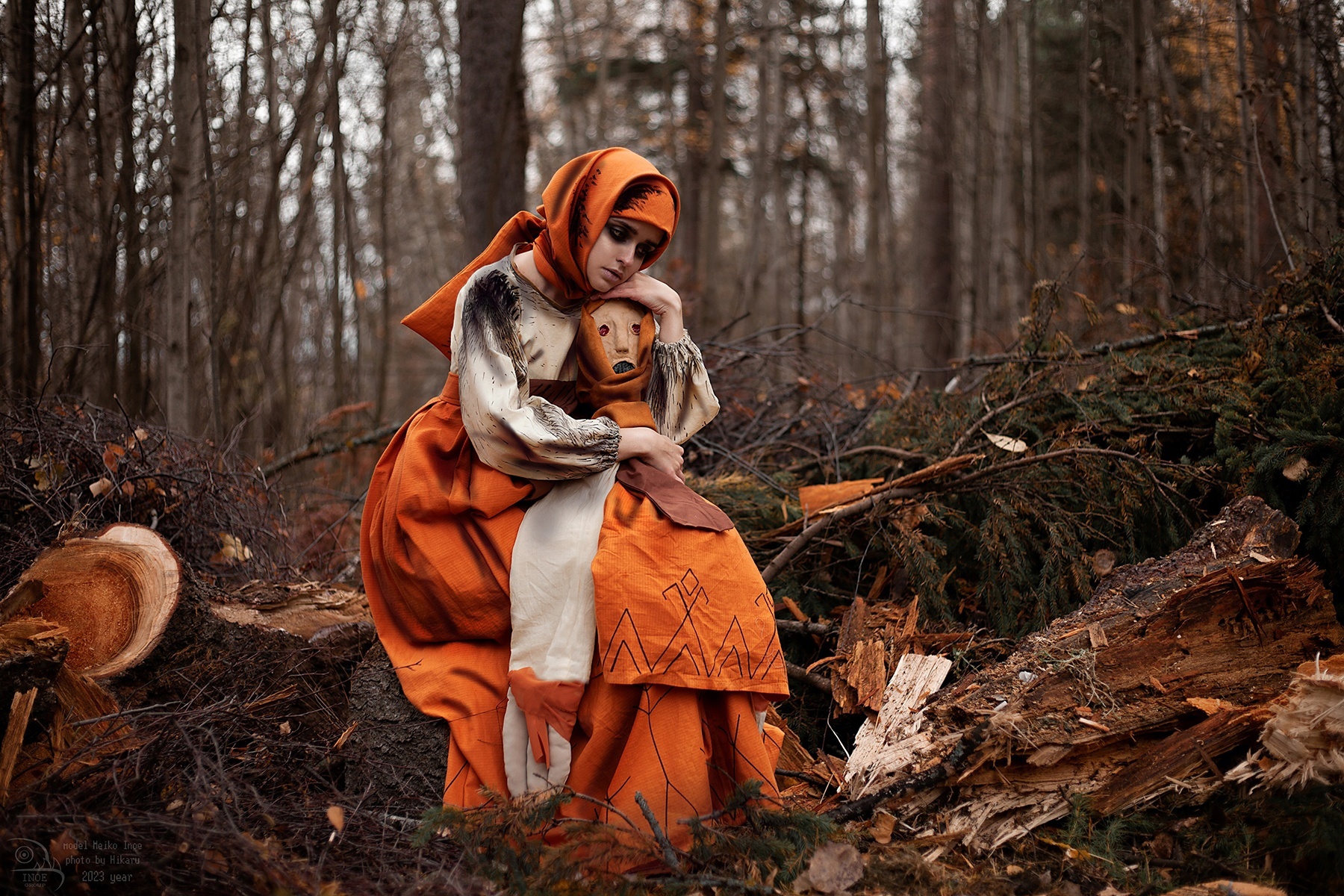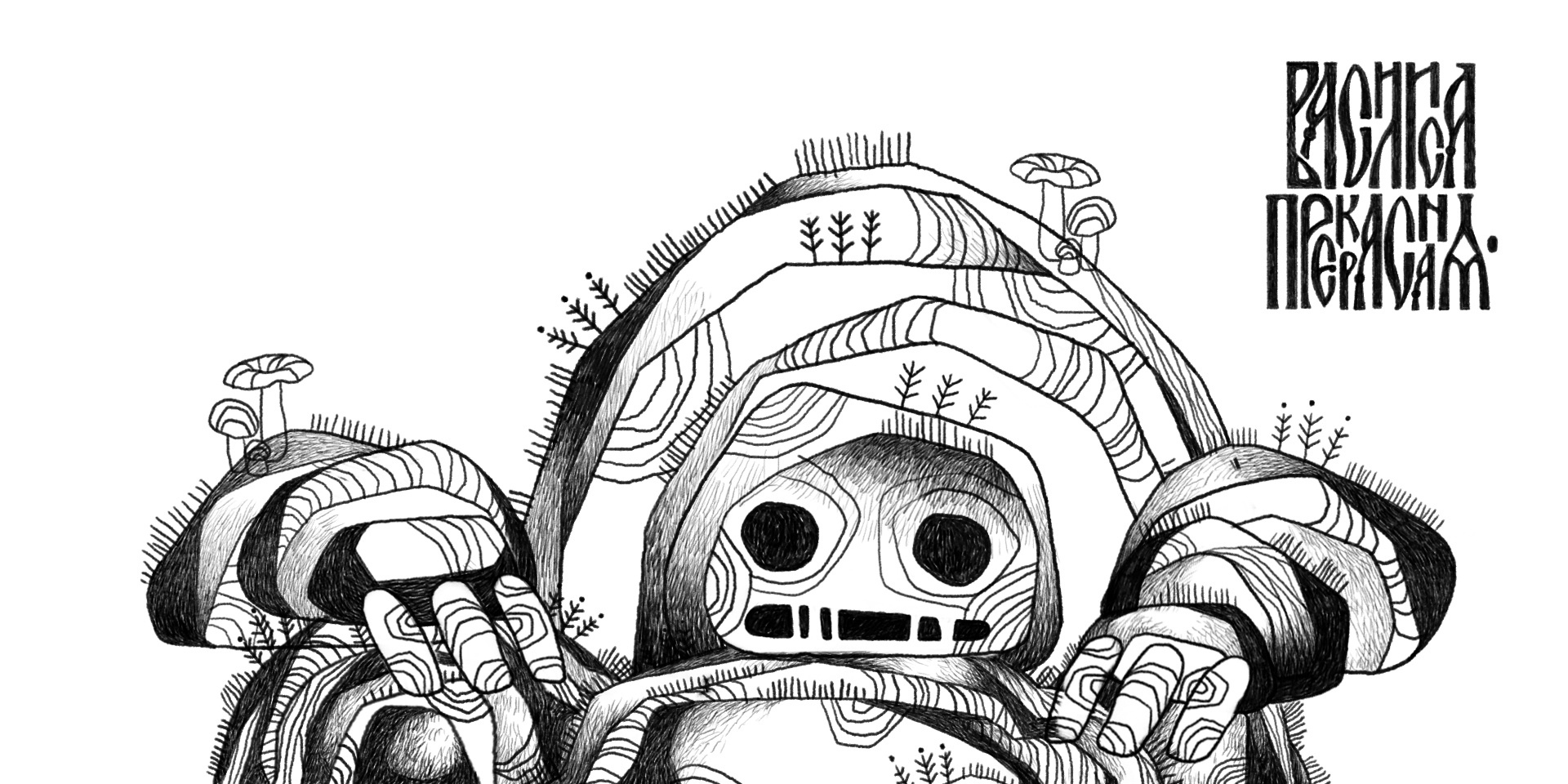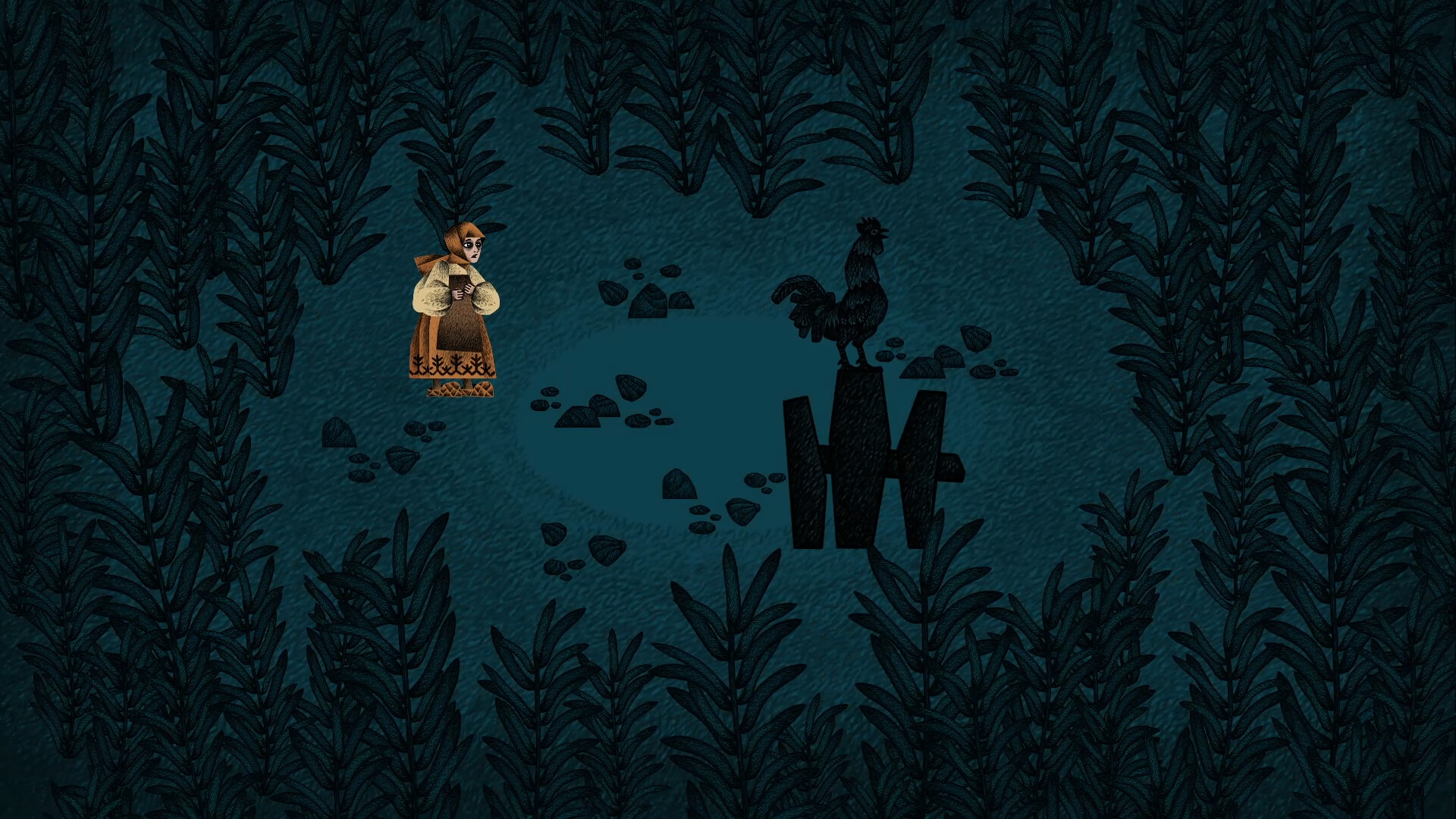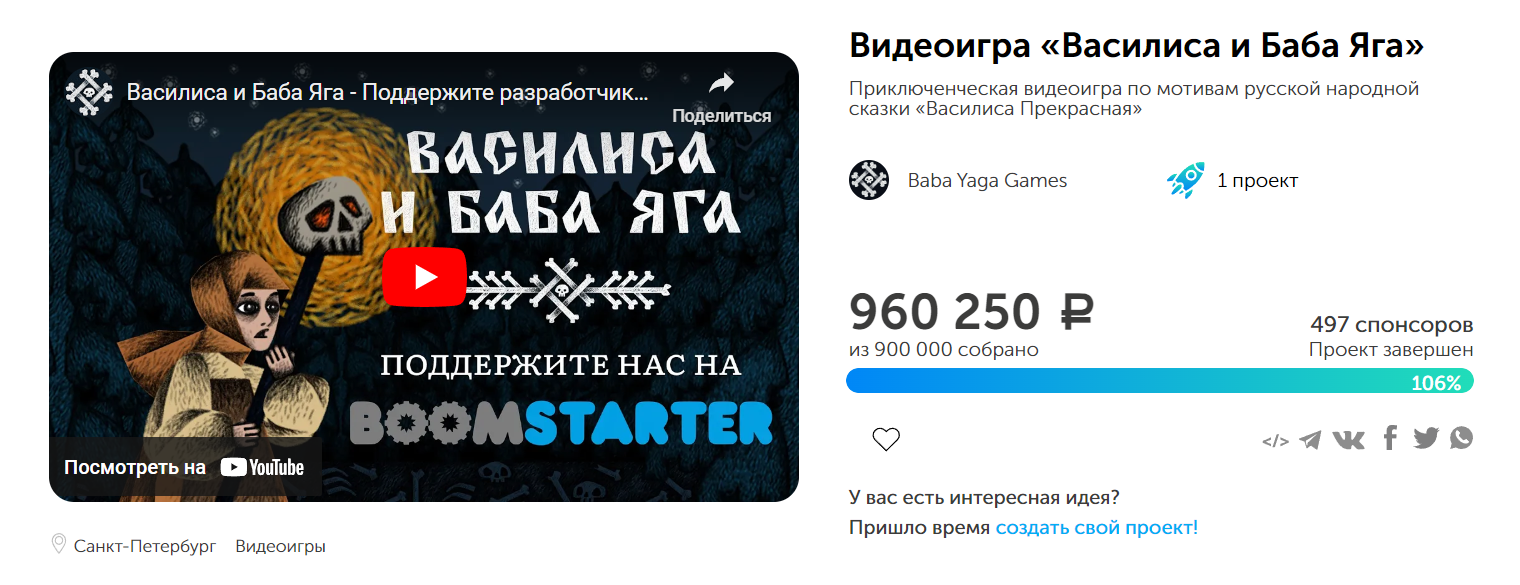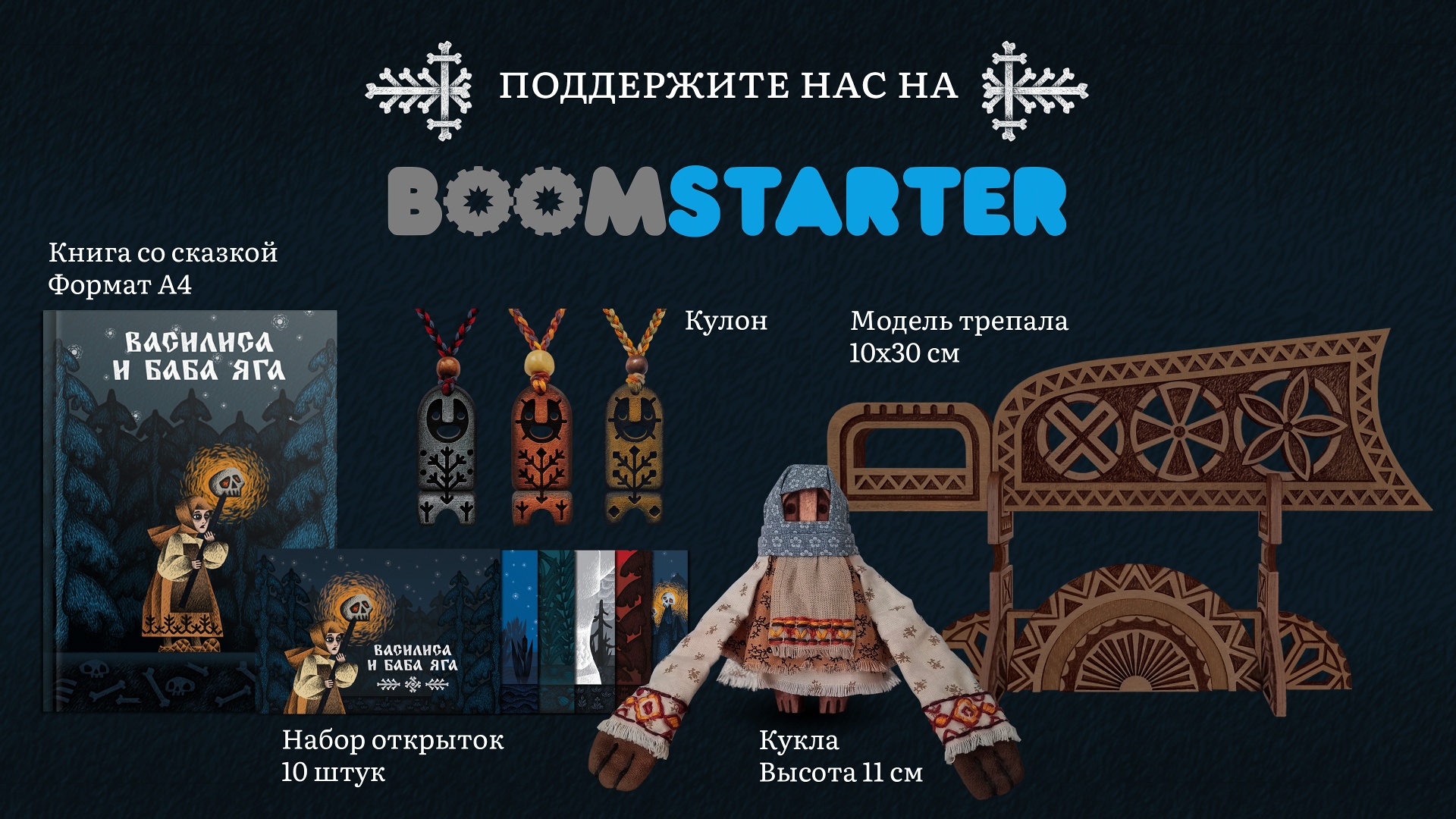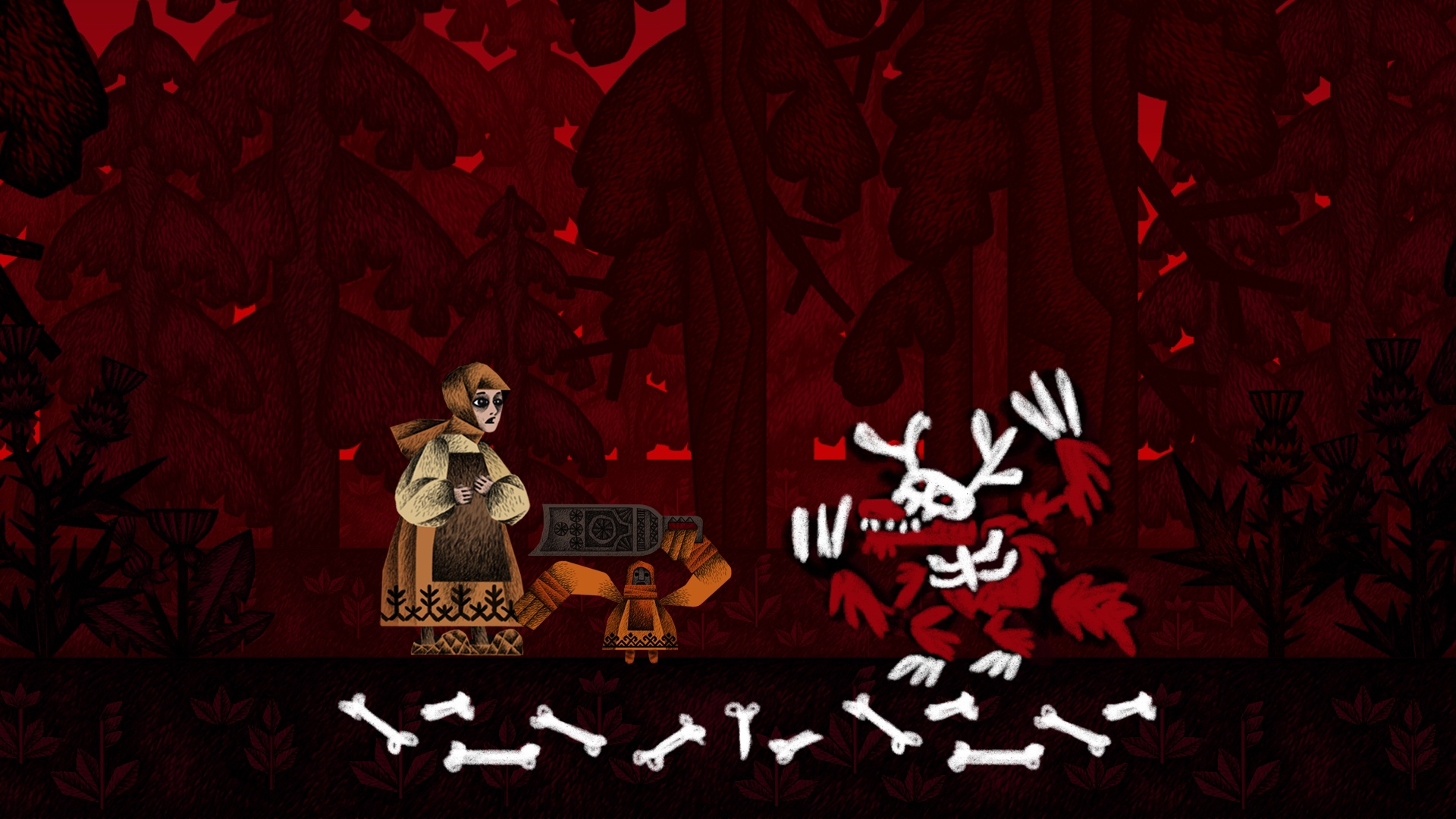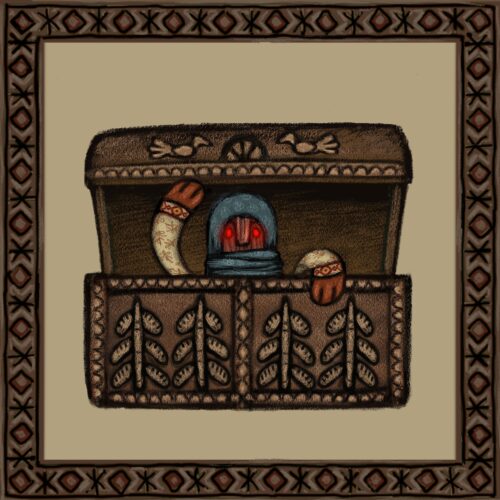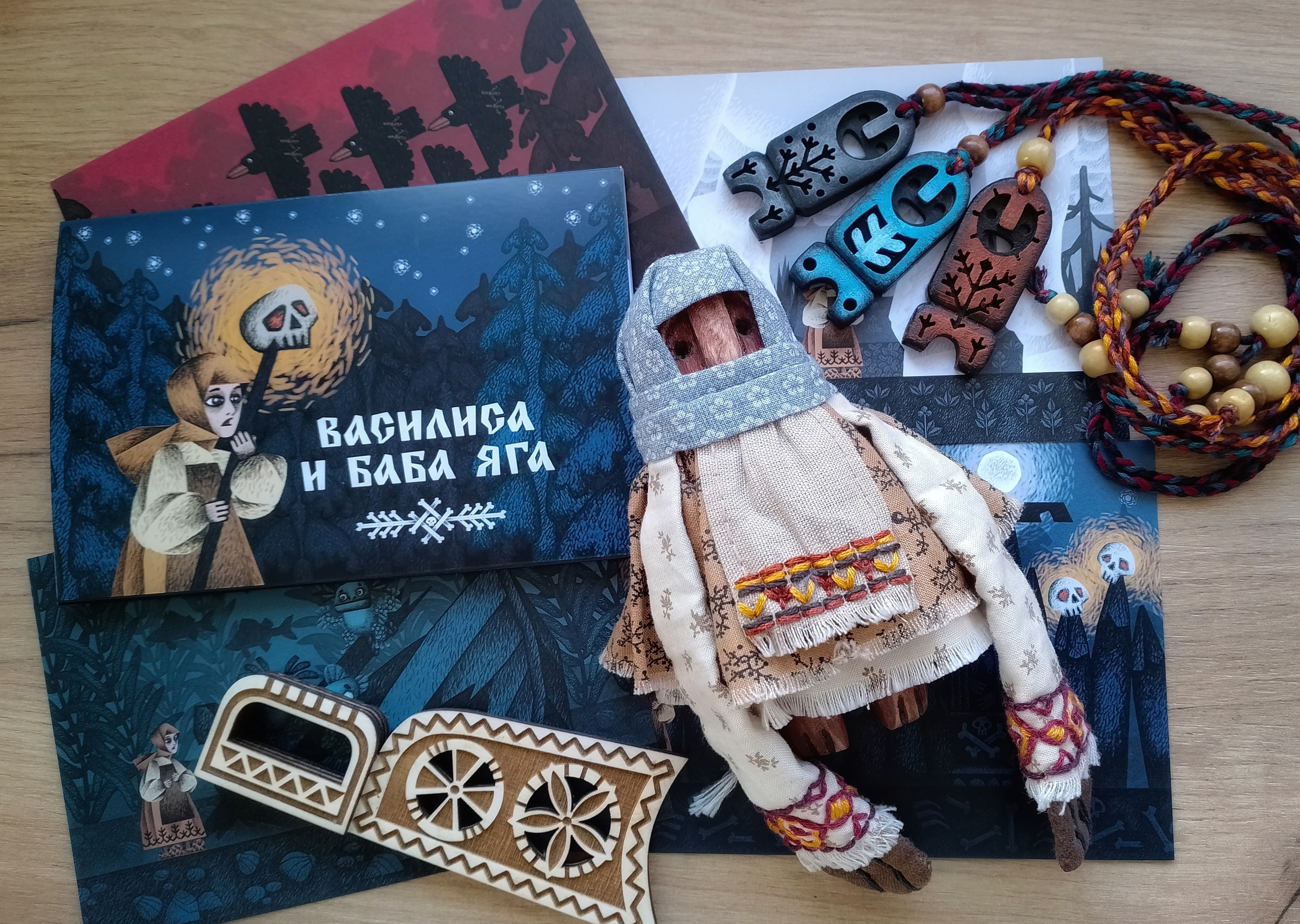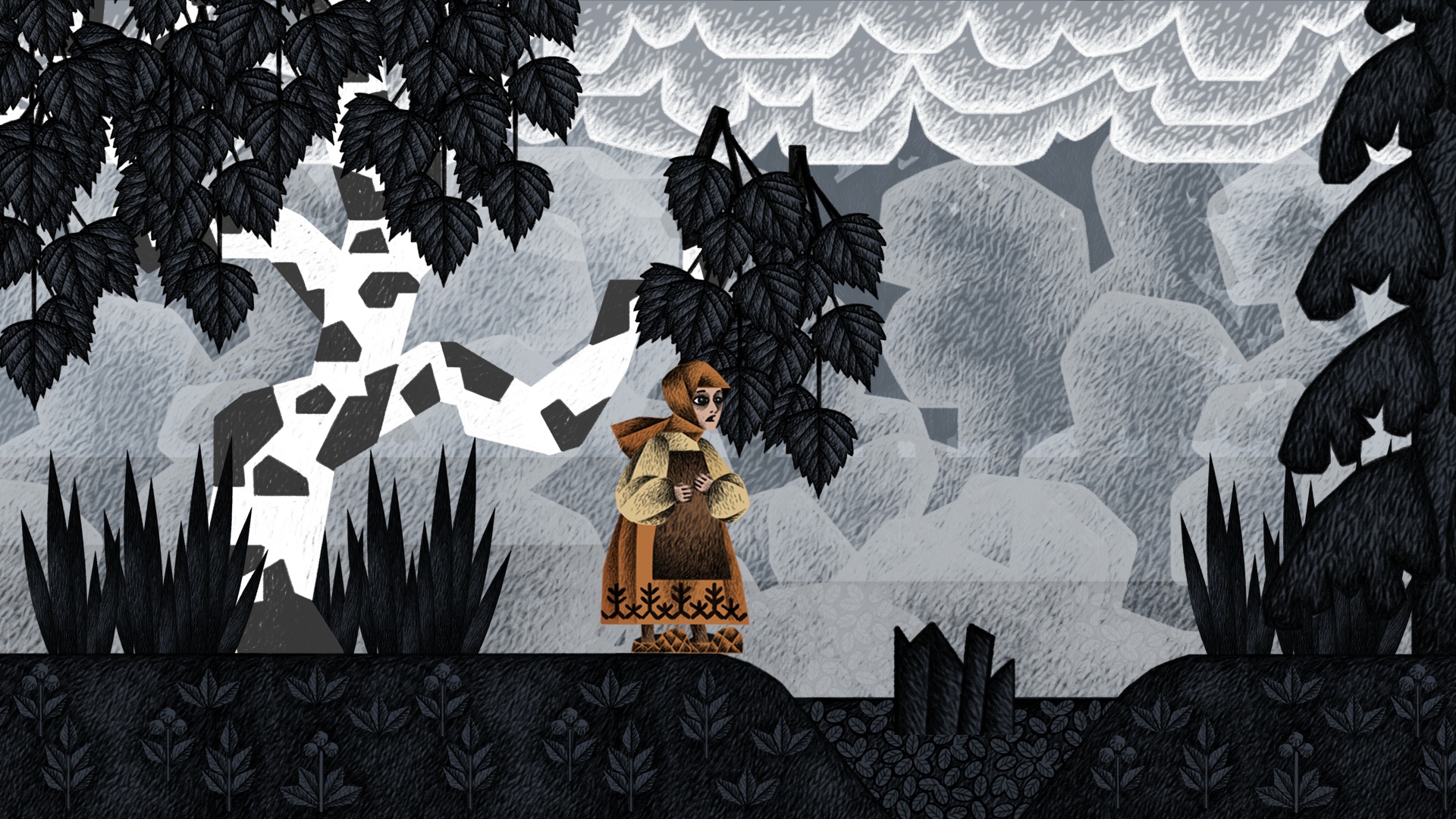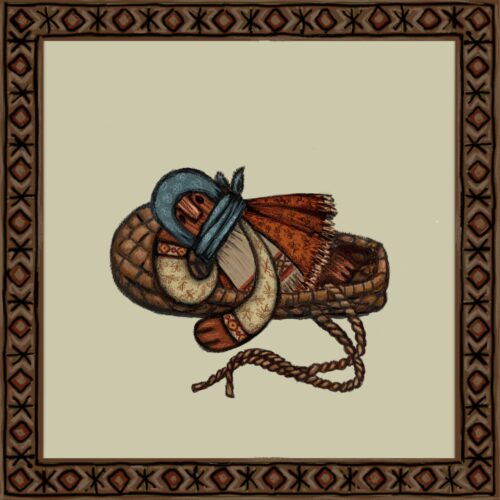In early October, a crowdfunding campaign to raise money for the development of the game Vasilisa and Baba Yaga was successfully completed. The game developers from the St. Petersburg studio Baba Yaga Games received 960 thousand rubles from sponsors. App2Top talked to Asya Yurina, co-founder of the studio, about how the campaign was going.
"Vasilisa and Baba Yaga"
Alexander Semenov, App2Top: Hi! Today we will talk in detail about crowdfunding, but we will start from afar. You've been in the industry for a long time. I remember how you participated in 2016-2017 developer exhibitions with "And again in spring" and "One-Eyed Kutha". These are very unusual projects. Their visual style can be compared to Soviet animation and can easily be attributed to art house. Can such projects feed the artist and their author today?
Asya Yurina
Asya Yurina, co-founder of BABA YAGA GAMES: Such projects may well feed the authors if the authors have already formed an audience of devoted fans who like such projects. It is not easy to find and gather such people around the studio, it takes a lot of time and effort, but it is possible. Amanita Design did it. We are still on the way, but we hope that we will be able to find our players too.
At least, the studio's games are already starting to be cosplayed (cosplayer — INOE cosplay, photographer — Nikita Parkhomenko)
I asked the previous question because I am delighted and pleased that you continue to experiment, look for working concepts, and develop games. Do I understand correctly that the upcoming release of Vasilisa and Baba Yaga has five years of creative searches?
Asya: Yes, it took a long time to work on Vasilisa.
We liked the idea of playing as a magical assistant (the player controls not only Vasilisa, but also her doll) from the very beginning, it was supposed to be the main feature of the game. But it took us a long time to decide what the game should look like in general. We started development three times. The first two times we couldn't put the game together into something complete. Perhaps some ideas need time to take shape. You can fight over them as much as you want, but it would be more correct to just postpone.
When we returned to the project for the third time, it seemed to be ready to appear, we very quickly realized exactly how to do it and what we could not do the first two times, the third turned out by itself.
One of the first concepts for the game dates back to 2017
Five years is a long time. Moreover, five years of experiments. It always seemed to me that such development is possible only if it is conducted as a hobby. How does this happen with you?
Asya: You're right, you can't earn a lot by experimenting for a living. And they can still take a long time. It is very sad that there are currently no support mechanisms for independent game developers that would allow them to experiment and look for new things without thinking about financing.
There are grants for original films and animation, there are grants for theatrical productions and exhibitions. But there are no programs to support author's games. Everyone thinks of video games only as a commercial product. Everyone wants us to take their CD Projekt RED and appear by themselves. But big things start small, you need to create an environment from which decent teams and big studios will grow over time.
In the meantime, we ourselves have to look for money for development, earn money from theatrical productions, save money. But it takes too long.
Why did you decide to move away from your usual approach of "saving money and slowly developing"?
Asya: We haven't been able to finish a single project for five years. Not only Vasilisa.
Also during these years, the studio worked a lot on the game "Mountain Hut", about the travels of the monk and poet Saige in medieval Japan
At some point, we realized that for full-fledged development, we only need to do development.
Plus, in the beginning we thought that Vasilisa would be a very small game, but gradually it grew. Our modest resources no longer matched our plans. That's when we thought about what options we have.
First, you decided to try to raise funds with the help of a government grant. First through "State Initiatives", then through Iran. Tell me how complicated the procedures were and what funds could you count on?
Asya: The procedures for applying for government funding are quite confusing, you can't figure it out right off the bat. But if you give it enough time and attention, you can handle it yourself. There are special offices that can help with the registration of applications. We did everything ourselves.
As for funds, grants do not limit you in the amount of the amount. The question is whether you can prove that your project needs exactly that amount of funds. If you convince, for example, IRI that your budget is realistic and meets the task, then you will receive the amount you requested.
As a result, the "State Initiatives" refused you, and you have already refused to work with Iran yourself. What was the reason for your refusal, which aspect of the negotiations confused you the most?
Asya: By the time it was necessary to conclude the contract, we had accumulated a lot of small doubts, there was uncertainty that we would be able to complete everything on time. Plus, from the very beginning we planned to sell the game not only in Russia, but also on international platforms, we thought that we would need a publisher for this. In modern realities, the availability of government funding could prevent this. In Iran, we were told that if we have doubts, it is better to stop now, because it will be much more difficult to terminate the signed agreement. We thought it over well and decided to give it up.
"Vasilisa and Baba Yaga"
Are you happy with your refusal to cooperate today?
Asya: Yes, we think we did the right thing. At the moment, our studio is not ready to work with government funding. We are too small and work rather chaotically. Perhaps when we grow up and stand on our feet more confidently, we will return to this idea.
How did you come up with the idea to take up crowdfunding? Was this the only possible option after the refusal to raise public money, or were you considering some other option?
Asya: Of course, this is not the only opportunity to raise funds and not the easiest. But we've always wanted to try something like this. The most interesting thing for us was to come up with material rewards that would suit the project and be valuable in themselves.
You set the goal of the campaign to set the amount of 900 thousand rubles. This is not much by the standards of gaming budgets, but it is quite significant for Russian crowdfunding and, of course, for indie teams. Can you tell me where exactly this amount came from?
Asya: In your question, you described our main considerations. Of course, this is a small amount for development, but in our opinion, it was the minimum amount for which it was worth all this to start. Of course, we would like to collect more than the stated goal, it would help us out a lot. Nevertheless, we consider the fact that we managed to collect 100% to be a great achievement.
In Russia, crowdfunding, by and large, is still poorly developed. In many ways, this situation has also developed because the projects that come to domestic sites approach the design and conduct of campaigns very frivolously. As a result, they do not attract enough attention, crowdfunding is developing slowly. Over time, we hope this will change.
The game's page on Boomstarter with campaign results
Have you calculated how much has already been spent on the game by the time of crowdfunding?
Asya: We had to do it. We talked with investors, and without specific figures, the investor will not listen to you.
In relation to Kickstarter, it is customary to say that it is a marketing tool. But for you, this is still primarily a story about finding financing. So?
Asya: No. We understood from the very beginning that running a campaign would take a lot of time and effort, slow down development and shift deadlines. But we decided on the campaign, among other things, because it is a good marketing reason, an opportunity to increase the audience that will be waiting for the release of the game.
A crowdfunding campaign attracts a lot of attention, especially if it is successful. The number of subscribers in our social networks has grown significantly, it's still not much, but for such a niche project, the result is significant (for example, the game has more than 2,800 subscribers in VK at the time of publication. — Ed.).
The crowdfunding campaign itself — how expensive is the event? On the same Kickstarter, according to some experts, the campaign costs a couple hundred thousand dollars. How expensive is crowdfunding in Russia, given the amount of content, effort and time that must be spent on its successful launch?
Asya: You can probably hire someone for a couple hundred thousand dollars to do everything for you, but this is if the campaign is primarily marketing for you and you have the funds for it. We spent some money on Boomstarter services (mailing lists, advertising on its social networks, additional impressions on the site). Plus, we ordered the distribution of a press release for the media and streamers. But we didn't have any extra funds to run the campaign. So we did everything on our own.
As for the time. It took a month to prepare everything necessary: page design, texts, trailer, video, production of awards. Another month and a half to run the campaign.
Rewards for sponsors
You have launched a campaign, released a demo version, and prepared a large number of rewards. How big a role did they play? Does it make sense to go to a fundraiser without them?
Asya: In our opinion, the presence of a demo version that would give a full idea of the future game is a prerequisite for launching a campaign. Sponsors will not have a misconception about the game; it will be much easier for those who play to make a decision whether to support your project or not; there will be fewer angry reviews and dissatisfied players on the release.
Material rewards also play a key role, especially for crowdfunding in Russia. People like to buy material things, they understand this concept. On the one hand, they help you, on the other — they acquire something tangible, something exclusive.
How did you promote crowdfunding?
Asya: We made posts on our social networks (we created new content, pictures, videos for this), wrote to groups with game themes, folklore themes, music groups, and specialized gaming media. We updated the news on the project page on Boomstarter, wrote articles on resources like DTF.
You used an agency. At the same time, you promoted the campaign yourself (you wrote to some media outlets, including us, personally), why?
Asya: We didn't have the funds to pay people who would do everything for us, it's quite expensive. We limited ourselves to sending out a press release. I had to do the rest on my own. If you are an indie and think of crowdfunding primarily as a possible fundraiser, then running a campaign on your own is a logical decision.
One of the awards for sponsors is a full-fledged book with a fairy tale about Vasilisa
Which of the channels turned out to be the most effective?
Asya: The most effective was the story about us in one of the iXBT videos.games. They have a large and active community, and many sponsors came at once. Unfortunately, it didn't last long. The information field is now oversaturated, after two or three days the news has lost its relevance, the flow of new sponsors has ended. If you want the campaign to move, you need to be reminded of yourself daily.
Is it possible to rely on one channel?
Asya: In our opinion, no. Although, if you already have a large and friendly community gathered around the game, then this is a definite guarantee of success. If we had ten thousand subscribers on social networks at the time of the campaign launch, instead of a thousand, we would have collected our 100% much faster.
How responsive were the public and the media in general?
Asya: The public in VK helped us with pleasure, in most cases. They liked the project. From the media, by and large, except for the iXBT video.However, there was no special response.
"Vasilisa and Baba Yaga"
Based on the experience you have gained, can you say that if there is interest in the project from the public and the media, it is possible to attract the necessary funding? Or is there some additional "secret ingredient"?
Asya: It's hard to say, crowdfunding is still a lottery. But if your project is good and the players like it, you have a demo that speaks for itself, you have a dedicated community that is waiting for the game — then the chances of success are high.
Do I understand correctly that the required amount was collected literally at the last moment? Was there, if anything, an opportunity to continue the campaign?
Asya: Yes, we reached 100% on the penultimate day. At that time, we had already extended the campaign for half a month. It could have been extended for a month, but we were very tired and worried that the development was not moving forward, since we were always busy coming up with new content to draw attention to the campaign.
If the specified amount had not been collected, what then?
Asya: There was an option to take part of the amount, Boomstarter allows it. We thought that two thirds of the amount is also not bad, at least it will pay for the sound for the game. If there had been less, we would have declared the campaign unsuccessful.
Art for the game
Will you use this experience when releasing the game itself? How effective, in your opinion, will this approach be in terms of promotion?
Asya: Well, sending out material rewards for sponsors will be a good marketing reason. In general, we learned a lot while we were campaigning. With crowdfunding, you can clearly see how effective your promotion efforts are.
You wrote in the development diaries that a third of the amount collected as part of the campaign is transfers of 50 thousand rubles. Who do you think these people are and why did they decide to do this?
Asya: About a third of the amount for any campaign is from sponsors who give large sums. Their existence came as a surprise to us, but we believed the Boomstarter statistics and made awards for 50 thousand rubles. The statistics did not lie. We do not know what these people are guided by, but I want to believe that the concept of "patron" still exists in Russia.
In general, how were the donations distributed by shares? What do you think about this distribution?
Asya: The most expensive material reward ended first. The two most expensive material rewards together brought about a third of the required amount. Another third were major sponsors (some of those who bought 50 thousand awards gave more than this amount). Options without material rewards (game, artbook, OST) brought one sixth of the total amount. Overall, as we thought, cool merch is an important component of success.
The helper doll is one of the most expensive awards
It is unusual that you decided to spend the collected money on development, and spend the proceeds on remuneration. Why?
Asya: Because now we need money primarily for development. Releasing the game is our main task. In addition, we will start doing merch immediately after the release, we hope that within a month we will be able to prepare and send everything out. The main expenses will be on printing books and postcards, packaging and shipping. Dolls, pendants and everything that should be done piece by piece, we are already slowly doing.
How high is the risk that you can go into negative territory by taking up sending rewards?
Asya: I think there is such a risk in our difficult times. But to be afraid of wolves is not to go into the forest. You can't insure against everything at once.
Have you already calculated how much the rewards can cost you? Can you estimate the amount?
Asya: Materials, printing, packaging, shipment — we hope that we will meet a third of the amount collected.
Is there any understanding or predictions of how much the game can earn?
Asya: It's hard to say. The Russian fairy tale is not the most neutral basis for the game. Maybe something will change by the release. Maybe we'll find a publisher after all.
What was the most difficult thing when launching the campaign?
Asya: Launching a campaign is not as difficult as maintaining it throughout the entire collection period. In the early days, your most loyal fans come. At the end of the campaign, if you are close to the goal, those who doubted come, followed you, but did not dare to participate until the result is obvious. But in the middle of the campaign, each new sponsor is your small victory.
The last question is: what's next, when to wait for the release of Vasilisa and Baba Yaga?
Asya: We hope to release the game in the first half of 2024. We have a small team, but we are making herculean efforts to keep up with the schedule. Game development is a creative business, which means anything can happen. We believe in the best and continue to work.
Art for the game

